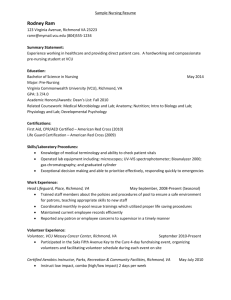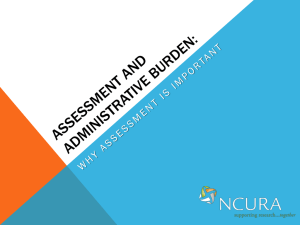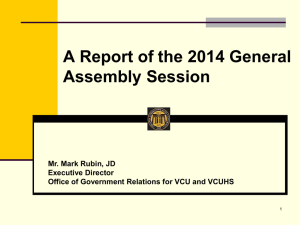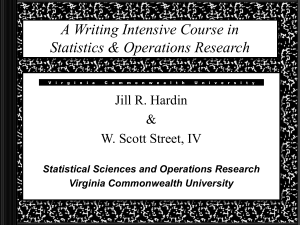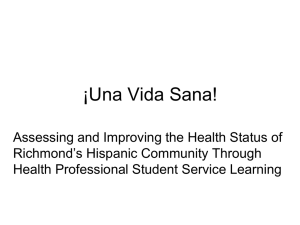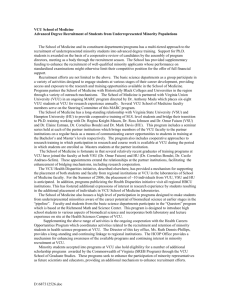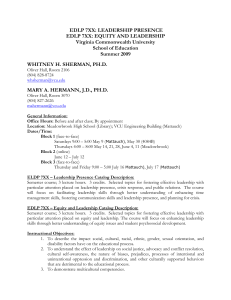Undergraduate Handbook - VCU School of the Arts
advertisement
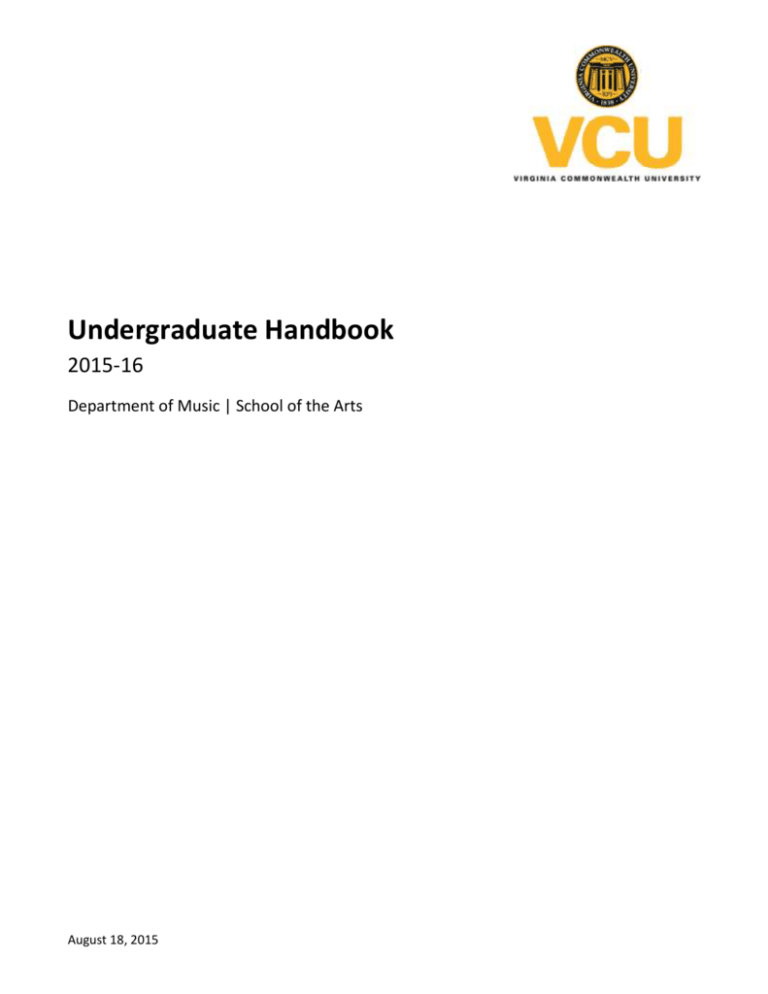
Undergraduate Handbook 2015-16 Department of Music | School of the Arts August 18, 2015 Department of Music Undergraduate Handbook 2015-16 Table of Contents 1.0 Department Protocols 1.1 Degrees and Concentrations 1.2 Continuance as a Music Major 1.3 Attendance Policy 2.0 Academic Advising 2.1 The Music Department Advisor 2.2 Advance Registration 2.3 Add/Drop 2.4 Withdrawal from Courses 2.5 Course Substitutions 2.6 Graduation Application 3.0 Applied Lessons 3.1 Principal Performance Area 3.2 Secondary Performance Area 3.3 Additional Music Lessons 3.4 Registering for Applied Lessons 3.5 Instructor Assignment 3.6 Juries 3.7 Absences and Make-Up Lessons 4.0 Recitals 4.1 Recital Requirements 4.2 Recital Permission Form 4.3 Program 4.4 Scheduling the Recital and Rehearsals 4.5 Pre-Hearing 4.6 Faculty Committees/Jurors 4.7 Recital Venue and Equipment 4.9 Special Recitals and Off-Campus Recitals 5.0 Facilities & Equipment 5.1 VCU School of the Arts Equipment Use Policy 5.2 Music Office Hours 5.3 Practice Rooms 5.4 Practice Room Equipment 5.5 Lockers 5.6 Recording Policy 1 1 1 1 2 2 2 2 2 2 2 3 3 3 3 3 3 4 4 5 5 5 5 5 5 6 6 6 6 6 7 7 8 8 8 5.8 Instrument Loan 5.9 University ID Cards 5.10 Posted Notices Policy 5.11 Smoking Policy 5.12 Concert Etiquette 6.0 Student Information Resources 6.1 VCU Email Accounts 6.2 VCU Music Students on Blackboard 6.3 VCU Music on Social Media 6.4 Music Service Organizations 6.5 Faculty and Staff Directory 6.6 Emergencies 8 8 8 9 9 10 10 10 10 10 10 10 VCU Music Undergraduate Handbook 2015-16 1 This handbook has been prepared to supplement the University Bulletin by articulating policies and requirements specific to the Department of Music for the academic year 2015-16. Academic regulations applicable to all undergraduate students are found in the VCU Bulletin available online at VCU Bulletins. 1.0 Department Protocols 1.1 Degrees and Concentrations All freshmen and transfers entering the Department of Music are admitted to one of the Department’s specific degree programs. The Music Department offers two types of degrees: the Bachelor of Arts degree; and the Bachelor of Music degree with the following concentrations representing various areas of study. Music Education/Instrumental Music Education/Vocal-Choral Performance/Guitar Performance/Jazz Studies Performance/Piano Performance/Strings Performance/Voice Performance/Winds and Percussion Please consult area-specific handbooks for policies specific to these concentrations. 1.2 Continuance as a Music Major The Music Department monitors student progress for the following: All Music majors are required to pass each successive applied-lessons (APPL) course required for their degree programs within any two-semester period (not including summers). All Music majors must pass Theory and Aural Skills I – II (MHIS 145-146) by the end of their fourth semester of attendance. Music majors are required to maintain a cumulative GPA of 2.0. Any student who fails to meet or maintain the above standards is subject to be discontinued from the Music Department. Once discontinued, any student who wishes to be readmitted to the department must reapply. 1.3 Attendance Policy Students should attend all classes and applied lessons on a regular basis. When a student misses a class session, it is his or her responsibility to complete all material covered or assignments made during the VCU Music Undergraduate Handbook 2015-16 2 absence. Instructors may establish attendance policies that vary from class to class. Instructors are not required to provide make-up tests or examinations for students who have been absent. 2.0 Academic Advising 2.1 The Music Department Advisor John Hendershot, the Music Department Advisor, works closely with students in planning class schedules; counseling about academic, personal or career issues; and in referring students to University services that may be of assistance in handling a wide variety of concerns. Students should consult Mr. Hendershot regarding all course scheduling or changes in registration, and see him as soon as any academic or personal difficulties arise. An advisor’s counsel should be sought whenever a decision is to be made regarding a curricular or registration matter. Students who do not meet with their advisor will have a registration hold placed on their account. 2.2 Advance Registration Students should register for their classes during the Advance Registration period. Advance registration increases a student’s chances to secure a place in the courses desired. See the VCU Academic Calendar for Advance Registration dates. 2.3 Add/Drop Students who find it necessary to make a change in course registration may do so during the Add/Drop period. See VCU Academic Calendars for Add/Drop period dates. Before making any changes, however, students should consult their advisors. 2.4 Withdrawal from Courses Students may withdraw from a course through the eighth week of classes. Such a withdrawal is marked on the student’s transcript as “W”. Withdrawals do not lower or raise the GPA. Final withdrawal dates are listed on the VCU Academic Calendar. 2.5 Course Substitutions In unusual cases, substitutions can be made for courses required for a student’s degree program. Requests for course substitutions may only be submitted on behalf of students by the advisor. Requests must be approved by the Chair of the Department of Music. 2.6 Graduation Application Students anticipating graduation must file a graduation application at the beginning of the semester in which they intend to graduate. Students must schedule an appointment with Mr. Hendershot to prepare the application. After it is complete, the application must be submitted to the Chair of the Music Department by the designated deadline. Graduation application deadlines may be found at VCU Academic Calendar. VCU Music Undergraduate Handbook 2015-16 3 3.0 Applied Lessons 3.1 Principal Performance Area All students are required to fulfill a certain number of credits of applied lessons in their principal performance area. The Music faculty has established a series of achievement levels for undergraduate study which correspond to the following courses. Requirements vary depending on a student’s degree concentration: APPL 311 –Level 1 APPL 312 –Level 2 APPL 313 –Level 3 APPL 314 –Level 4 APPL 415 –Level 5 APPL 416 –Level 6 APPL 417 –Level 7 APPL 418 –Level 8 3.2 Secondary Performance Area Students in the Bachelor of Music degree program are required to fulfill credits in a secondary performance area. Courses for the secondary performance area are as follows. Course requirements vary depending on a student’s degree concentration: APPL 320 –Non-level-bearing APPL 321 –Level 1 APPL 322 –Level 2 APPL 323 –Level 3 APPL 324 –Level 4 3.3 Additional Music Lessons In consultation with their advisor, music majors may request to enroll in applied lesson courses in addition to those required for their degree programs. These lessons are designated with the course number APPL 200. 3.4 Registering for Applied Lessons Students must register for Applied Lessons during the Advance Registration period. Failure to register in advance may result in the unavailability of lessons or the unavailability of the preferred instructor, as private lesson rosters reach capacity very quickly. See VCU Academic Calendars for Advance Registration dates. 3.5 Instructor Assignment Students studying in an applied music area taught by more than one faculty member may request assignment to a particular instructor. Such requests must be submitted in writing to the Area Coordinator at least two weeks before the beginning of the new semester. VCU Music Undergraduate Handbook 2015-16 Instructor assignments are posted on the main bulletin board outside of the Music Office during the first week of classes each semester. It is the student’s responsibility to contact the instructor before the end of the first full week of classes to schedule a lesson time. Any difficulty in contacting an instructor and/or scheduling a lesson should be reported to the Music Office staff immediately. 3.6 Juries Any student taking a level-bearing applied lesson course is required to take a jury in that semester. In all cases, the jury will be considered an examination. The jury examination grade will be calculated as 25% of the student’s semester grade in the respective applied lesson. All Applied Lesson courses designated for levels require a minimum grade of “C” to advance to the next level. 3.7 Absences and Make-Up Lessons Applied music instructors may, at their discretion, excuse a student’s absence from a lesson. If a student is excused or the faculty member must cancel a lesson, a make-up lesson is in order. Make-up lessons are not obligatory for unexcused absences. 4 VCU Music Undergraduate Handbook 2015-16 5 4.0 Recitals 4.1 Recital Requirements Students enrolled in APPL 416 are required to complete the Junior Recital in place of the jury. Students enrolled in APPL 418 are required to complete the Senior Recital in place of the jury. 4.2 Recital Permission Form Completion of the Recital Permission Form is required for all recitals. Visit the Music Department Office for a copy of the Recital Permission Form. 4.3 Program Each student is responsible for preparing a recital program in the required format. The Recital Program template for each degree program can be found on the Recital Information page on the Music Department website. The program must be submitted to the Applied Lesson Instructor and the Area Coordinator at least three weeks prior to the recital. Certain areas have additional specific requirements. Consult area handbooks for all area-specific requirements. Fifty copies of the recital program will be printed at departmental expense and made available for the performance. The printing of program notes and/or texts and translations is the responsibility of the student. No other inserts are permitted. It is the student’s responsibility to provide ushers for the recital. Any student who fails to comply with the recital rules and regulations will not be permitted to present the recital as scheduled. 4.4 Scheduling the Recital and Rehearsals Recitals are scheduled by Facilities Manager Curt Blankenship. Junior Recitals are 30 minutes in total duration. Junior Recitals may only be scheduled Monday-Friday and only in the Recital Hall. Senior Recitals are one hour in total duration. Senior Recitals may be scheduled during the week or weekends and in either the Recital Hall or the Concert Hall. No student recital may be scheduled until the first day of the semester in which it is to be presented. All recitals must be presented during the Fall or Spring semesters; recitals may not be given during exam periods or during summer sessions. Rehearsal time in the Sonia Vlahcevic Concert Hall or the Music Center Recital Hall must be scheduled through the Facilities Manager. Senior recitalists may schedule a maximum of four hours of rehearsal time. Students presenting a junior recital may schedule a maximum of two hours of rehearsal in the appropriate hall. 4.5 Pre-Hearing Certain Areas of Study require students to pass a pre-hearing prior to the recital. Consult Areaspecific requirements for more information. VCU Music Undergraduate Handbook 2015-16 4.6 Faculty Committees/Jurors Faculty committees are appointed for the evaluation of all recitals. A jury committee of three faculty members, to be selected by the student, the applied teacher, and the area coordinator, will assess Junior and Senior Recitals for degree credit. Jurors should be able to attend the recital in person whenever possible. In the unusual case when a juror is unable to attend the recital, it is the responsibility of the student to provide the juror with an audio or video recording of the recital. 4.7 Recital Venue and Equipment A Request for Equipment Form can be obtained from the Concert Hall/Facilities Manager and must be submitted three weeks before the recital date. The Concert Hall/Facilities Manager will open the recital venue a maximum of 30 minutes before the performance and will secure the hall at the performance’s conclusion. Lighting is preset for student recitals. Special lighting requests must be submitted to the Concert Hall/Facilities Manager no later than two weeks prior to the recital. Special lighting requests that are approved by the Concert Hall/Facilities Manager will only be provided at the expense of the student presenting the recital. All student recitals are recorded to a server by a recording technician. The recording is made available for download on Scholar’s Compass, a resource of Cabell Library. 4.8 Recital Posters See 5.10 Posted Notices Policy. 4.9 Special Recitals and Off-Campus Recitals Any recital not required for a student’s degree program is considered to be a Special Recital. Special Recitals may only be scheduled during the first eight weeks of the semester Monday-Friday. Complete the Special Recital Application Form with signatures from the applied instructor and area coordinator. 5.0 Facilities & Equipment 5.1 VCU School of the Arts Equipment Use Policy VCU School of the Arts students are only allowed to use University or School equipment, facilities, or licensed material (including software) off-campus if such use is for a formal class assignment supervised by a VCUarts faculty member. Students are not allowed to use University or School equipment, facilities, or licensed material (including software) on- or off-campus for professional projects of their own (i.e. engaging in work-for-hire with a company or individual). This will be considered a criminal offense and could result in legal action and/or suspension from the University. The only exception to this policy is for projects formally sanctioned by a VCUarts department and supervised by a faculty member 6 VCU Music Undergraduate Handbook 2015-16 7 associated with that department. Specific questions regarding this policy should be directed to Concert Hall and Facilities Manager Curt Blankenship. 5.2 Music Office Hours The VCU Department of Music Office is open from 8:30 a.m. until 4:30 p.m. each weekday, excluding university holidays. Students may schedule appointments with any faculty member. Full-time faculty members will also post office hours for walk-in appointments. 5.3 Practice Rooms For student convenience, 14 practice room modules are located on the academic campus. Singleton Center Rm. 217 holds three practice room modules, Rm. 215 contains two practice room modules, and each floor of the Black Music Center contains three practice room modules. Card access to VCU Music Practice Rooms is given to enrolled music majors, music minors and University students enrolled in applied lessons for University credit. In order to be granted access to VCU practice rooms, students must fill out the Student Contact Information form online. The student’s VCU ID card will then be activated for practice room access within 3 business days. Access will remain in effect for the academic year as long as the student remains enrolled in music classes. The practice room suites/modules are accessible from 7 a.m. to 12 a.m. every day, excluding University holidays. For security reasons, practice rooms must remain locked at all times. Do not prop open the door to the Practice Room Suites or modules. Students are required to have their VCU ID card with them at all times when using VCU Music facilities. Any unauthorized students in the practice rooms will be subject to Honor System proceedings. Organ, percussion and piano practice rooms are only available to students taking applied lessons on those instruments and with the written permission of the instructor. Keys to these practice rooms as well as faculty studios must be obtained from Curt Blankenship. Students obtaining keys to these areas will be asked to sign a Key Contract. Keys must be returned by the last day of exams in the spring semester or when the student is no longer enrolled as a current Music student. A hold will be placed on the student’s account if keys are not returned. Please note: Food and drink are NOT allowed in practice rooms. Please report any facilities issues to Curt Blankenship (Rm. 150, Singleton Center). Groups of 3 or more musicians must make arrangements through their instructor and/or Facilities Manager Curt Blankenship for rehearsal space. Students and faculty may not teach for remuneration in any VCU Music facility. Doing so is a violation of University policy and Virginia law. See 5.1 VCU School of the Arts Equipment Use VCU Music Undergraduate Handbook 2015-16 8 Policy. 5.4 Practice Room Equipment VCU Music maintains a supply of metronomes, recording devices, and other tools useful for daily practice. These are available to music students on a sign-out basis. Please see Facilities Manager Curt Blankenship for details. 5.5 Lockers Lockers for books, instruments and personal items are available to Music majors on a limited basis. Locker sign-up takes place at the beginning of the Fall semester. Priority will be given to those who sign up first, with consideration given to major instruments, instrument size and locker availability. All lockers are to be emptied at the end of each Spring semester. 5.6 Recording Policy Individuals are prohibited from making audio or video recordings of events taking place in the Concert Hall or the Recital Hall. The Music Department creates archival recordings of most events. Concert recordings are housed at Cabell Library. Individuals are prohibited from uploading recordings to thirdparty websites such as YouTube or Facebook. Contact Facilities Manager Curt Blankenship for further information. 5.8 Instrument Loan A limited number of woodwind, brass and string instruments are available for loan to qualified students for use in instrumental technique classes and ensembles. Instruments are distributed on a first-come, first-served basis. Students are responsible for the instruments issued to them. Students who are issued an instrument must sign an agreement to repair or replace instruments if deemed necessary by the Music Department. If the repair(s) or replacement is not made, a hold will be placed on the student’s record and the student will not be permitted to register for classes nor obtain transcripts or records. Students are also expected to replace or repair at their expense small items or accessories, such as strings, pads, and reeds, as needed during the time in which the instrument is issued to them. A hold will also be imposed if the instrument is not returned at the end of the pre-determined borrowing period. Legal action will be taken if deemed necessary. VCU Music instruments are not to be used for “gigs” or for summer jobs. Please see 5.1 VCU School of the Arts Equipment Use Policy. In the event that all department instruments have been loaned, students must make their own arrangements to borrow an instrument or to rent one from a local music store. 5.9 University ID Cards The VCU ID card issued to students upon initial registration allows students access to VCU Music facilities. Students without a valid VCU ID card will be asked to leave the premises. 5.10 Posted Notices Policy All fliers and notices posted on VCU Music Bulletin Boards or in VCU Music buildings must be approved, 9 VCU Music Undergraduate Handbook 2015-16 signed, and posted by VCU Music Office staff. Any notices posted without approval from the VCU Department of Music will be removed and destroyed without notice. VCU Music reserves the right to move or remove any sign or flier posted on its bulletin boards without notice. Following is a list of the types and number of fliers that VCU Music will accept to post on its bulletin boards once approved: Poster type VCU Music Events Student Recitals Community Events/Concerts VCU Events (non-music) For Sale/Job Opportunities # Of posters permitted 6 5 4 4 3 Amount of time posters may be visible 3 weeks before event 2 weeks before event 3 weeks before event 3 weeks before event Posted for 4 weeks Posters and flyers advertising student recitals or student ensemble performance (for a grade or otherwise) must contain certain VCU and VCUarts logo elements. Questions about these elements should be directed to Director of Communications Amy Sheets. Posters and flyers that fail to incorporate these required elements will be removed. 5.11 Smoking Policy Smoking is prohibited in the Singleton Center or the James W. Black Music Center. Students are required to restrict smoking to areas outside of the buildings. 5.12 Concert Etiquette 1. Enter the performance space before the performance begins and exit after it ends. If you arrive late or must exit the room early, do so during breaks for applause. 2. Do not bring food and drink into the performance space. 3. The use of cellular phones and texting devices is prohibited. Please turn off your cell phone when entering any of these locales. 4. Do not use any music playing device such as iPods or mp3 players. Recording devices are prohibited (see 6.6 Recording Policy). Photography is prohibited. 5. Remove hoods and hats inside the performance space. 6. Do not talk or whisper while the performance is occurring. This is distracting to the audience and the performers. 7. Do not take notes or do other writing of any kind during a performance. 8. Do not sleep during a performance. VCU Music Undergraduate Handbook 2015-16 10 6.0 Student Information Resources 6.1 VCU Email Accounts The Department of Music uses VCU email accounts to communicate directly with VCU Music students. Be sure to check your VCU email account regularly. 6.2 VCU Music Students on Blackboard Check the “VCU Music Students organization” on Blackboard often for announcements about scholarship opportunities, gigs, concerts and events, schedule changes, and other news. 6.3 VCU Music on Social Media VCU Music is on Facebook, Instagram, and Twitter. Follow us to receive updates about concerts and events and to interact with students, alumni, and supporters. Tag #vcumusic to share posts with the department. 6.4 Music Service Organizations VCU Music hosts chapters of Kappa Kappa Psi (KKΨ), Phi Mu Alpha (ΦMA), the American Choral Director’s Association (ACDA), and the National Association for Music Education (NAfME), all of which provide opportunities for service in the department and the community at large. 6.5 Faculty and Staff Directory A directory of the Music Department Faculty and Staff is available on the Music Department website. 6.6 Emergencies What to know and do to be prepared for emergencies at VCU: Sign up to receive VCU text messaging alerts. Keep your information up-to-date. Know the safe evacuation route from each of your classrooms. Emergency evacuation routes are posted in on-campus classrooms. Listen for and follow instructions from VCU or other designated authorities. Know where to go for additional emergency information. Know the emergency phone number for the VCU Police (828-1234). Report suspicious activities and objects.
